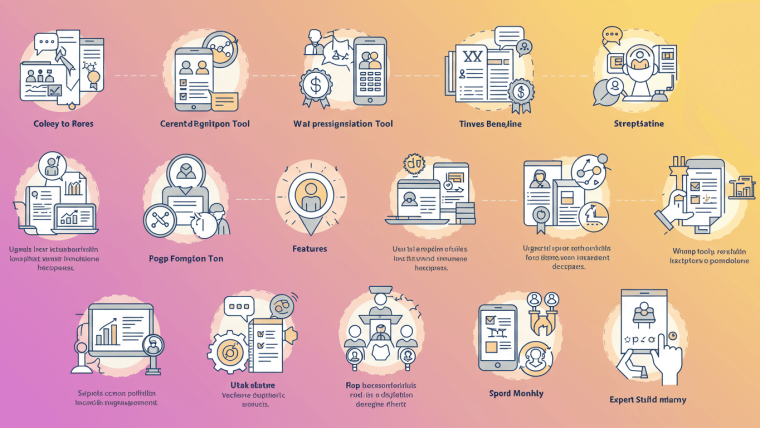Virtual events have fundamentally changed how businesses connect with their audiences. What started as a pandemic necessity has evolved into a powerful marketing channel that offers unique advantages for both event organizers and sponsors. Unlike traditional in-person gatherings, virtual events provide measurable engagement data, global reach, and cost-effective participation options that make them attractive to sponsors across industries.
The sponsorship landscape for virtual events differs significantly from traditional event partnerships. Sponsors can now access detailed analytics about attendee behavior, engagement levels, and conversion rates. This data-driven approach allows for more strategic partnerships and better return on investment calculations. Event organizers, meanwhile, can offer more flexible sponsorship packages that cater to various budget levels and marketing objectives.
Understanding these sponsorship opportunities is crucial for event planners looking to generate revenue and businesses seeking effective marketing channels. The virtual format opens doors to creative sponsorship activations that simply aren’t possible at physical events, from interactive branded experiences to personalized attendee journeys.
Understanding Virtual Event Sponsorship Models

Traditional Sponsorship Tiers Reimagined
Virtual events maintain familiar sponsorship structures while introducing new possibilities. Title sponsors still enjoy prominent branding and speaking opportunities, but their visibility extends beyond physical signage to include digital touchpoints throughout the attendee experience. Premium sponsors might receive virtual booth spaces, branded breakout rooms, or exclusive networking lounges that remain accessible throughout the event duration.
Mid-tier sponsors often benefit from targeted exposure opportunities like sponsored chat features, branded poll questions, or dedicated email mentions in event communications. These positions offer measurable engagement metrics that help sponsors understand their investment impact.
Content Integration Sponsorships
One of the most valuable virtual event sponsorship opportunities lies in content integration. Sponsors can co-create educational sessions, provide thought leadership content, or offer exclusive resources that align with event themes. This approach positions sponsors as subject matter experts while providing genuine value to attendees.
Educational sponsorships might include sponsored workshops, masterclasses, or certification programs that extend beyond the live event. These partnerships create lasting value for attendees while giving sponsors extended exposure and lead generation opportunities.
Technology Partnership Opportunities
Virtual events rely heavily on technology platforms, creating natural partnership opportunities with tech companies. Platform sponsors might provide event apps, networking tools, or engagement features in exchange for branding rights and attendee data insights.
These technical partnerships often prove mutually beneficial, as sponsors gain access to user behavior data while event organizers receive enhanced functionality at reduced costs. Integration opportunities include branded login screens, sponsored gamification features, and custom networking algorithms.
Innovative Sponsorship Opportunities Unique to Virtual Events
Interactive Brand Experiences
Virtual events enable sponsors to create immersive brand experiences that surpass traditional booth interactions. Sponsors can develop virtual showrooms with product demonstrations, interactive tours, or augmented reality experiences that attendees can access on demand.
These digital experiences can include downloadable resources, appointment scheduling systems, and direct communication channels with sales teams. The virtual format allows for personalized experiences based on attendee preferences and behavior patterns.
Data-Driven Engagement Opportunities
Virtual platforms provide unprecedented access to attendee engagement data. Sponsors can leverage this information to create targeted messaging, personalized content recommendations, and customized follow-up strategies. Real-time analytics allow sponsors to adjust their approach during the event based on attendee response patterns.
Advanced sponsorship packages might include access to attendee journey mapping, engagement scoring, and conversion tracking that helps sponsors understand which activities drive the most valuable leads.
Global Reach Sponsorships
Virtual events eliminate geographical barriers, allowing sponsors to reach international audiences without additional travel or logistics costs. This global accessibility creates opportunities for sponsors to test new markets, expand their international presence, or connect with niche audiences that might be scattered across different regions.
International sponsors can participate meaningfully in events regardless of time zone differences through on-demand content, asynchronous networking opportunities, and recorded presentations that extend their exposure period.
Maximizing Sponsor Value in Virtual Events
Pre-Event Engagement Strategies
Successful virtual event sponsorships begin weeks before the live event. Sponsors can participate in pre-event marketing campaigns, contribute to attendee surveys that inform event content, or provide early-bird incentives that drive registration numbers.
Email marketing campaigns offer sponsors multiple touchpoints with potential attendees. Sponsored content in registration confirmations, reminder emails, and preparatory materials ensures consistent brand exposure throughout the attendee journey.
During-Event Activation Tactics
Live virtual events provide numerous real-time engagement opportunities. Sponsors can host live Q&A sessions, participate in panel discussions, or offer instant prizes through gamification features. Chat sponsorships allow brands to maintain visibility throughout sessions while providing valuable resources or answering attendee questions.
Interactive polls, surveys, and quizzes sponsored by partners create engagement opportunities while collecting valuable market research data. These activities can be seamlessly integrated into presentation content without feeling overly promotional.
Post-Event Follow-Up Opportunities
Virtual events often provide sponsors with detailed attendee contact information and engagement data that facilitates targeted follow-up campaigns. Sponsors can access information about which sessions attendees viewed, resources they downloaded, and interactions they had with sponsored content.
This data enables personalized outreach strategies that reference specific attendee interests and behaviors. Post-event surveys sponsored by partners can gather additional insights while maintaining brand visibility after the live event concludes.
Pricing Strategies for Virtual Event Sponsorships
Value-Based Pricing Models
Virtual event sponsorship pricing should reflect the unique value propositions these events offer. Unlike traditional events where pricing might focus on booth size or speaking slot duration, virtual event packages should emphasize reach, engagement metrics, and lead generation potential.
Sponsors often find virtual events more cost-effective than traditional alternatives when considering travel, accommodation, and logistics expenses. This cost difference allows event organizers to offer competitive pricing while maintaining healthy profit margins.
Flexible Package Options
Virtual platforms enable more flexible sponsorship structures that can accommodate various budget levels. Micro-sponsorships might include single-session branding or specific feature sponsorships, while comprehensive packages could encompass multiple touchpoints throughout the event experience.
Tiered pricing structures allow sponsors to scale their investment based on objectives and budget constraints. Entry-level packages might focus on brand visibility, while premium options include lead generation tools, detailed analytics, and extended post-event engagement opportunities.
Performance-Based Pricing
Some virtual events experiment with performance-based sponsorship pricing that ties costs to specific outcomes like attendee engagement levels, lead generation numbers, or post-event conversion rates. This approach aligns sponsor and organizer interests while demonstrating clear value delivery.
Performance metrics might include session attendance rates for sponsored content, engagement scores for branded activities, or follow-up meeting bookings generated through the platform.
Technology Considerations for Sponsor Integration

Platform Compatibility
Successful virtual event sponsorships require seamless integration between sponsor content and event platforms. Event organizers must ensure their chosen technology supports various sponsor activation methods, from simple logo placement to complex interactive experiences.
Platform selection should consider sponsor integration capabilities, customization options, and data sharing features that enable valuable sponsor partnerships. Advanced platforms offer API integrations that allow sponsors to connect their own marketing tools and CRM systems.
Branding Flexibility
Virtual event platforms should accommodate various sponsor branding requirements while maintaining event cohesion. Customizable interfaces, branded virtual environments, and flexible design templates allow sponsors to maintain brand consistency within the event experience.
Color schemes, logos, and messaging should integrate naturally into the overall event design without creating jarring transitions or overwhelming attendee experience.
Measuring Virtual Event Sponsorship Success
Key Performance Indicators
Virtual events provide detailed metrics that help both organizers and sponsors evaluate partnership success. Attendance figures, engagement rates, content consumption patterns, and lead generation numbers offer quantifiable measures of sponsor value delivery.
Advanced analytics might include session replay data, user journey mapping, and conversion tracking that provides comprehensive insight into sponsor impact. These metrics enable continuous improvement and help justify future sponsorship investments.
Return on Investment Calculations
Sponsors can calculate ROI more precisely for virtual events thanks to detailed tracking capabilities. Cost per lead, engagement cost ratios, and conversion value measurements provide clear financial justifications for virtual event sponsorship investments.
Comparative analysis between virtual and traditional event performance helps sponsors make informed decisions about future marketing spend allocation.
Building Long-Term Sponsor Relationships
Virtual events often facilitate stronger, more data-driven relationships between organizers and sponsors. The wealth of available analytics and extended engagement periods create opportunities for deeper partnership development beyond single-event transactions.
Regular performance reviews, strategic planning sessions, and collaborative content development help transform one-time sponsors into long-term partners. Virtual formats make these ongoing relationships more manageable and cost-effective for all parties involved.
Successful sponsor relationships in virtual environments focus on mutual value creation, data sharing, and continuous optimization based on performance insights.
Transform Your Virtual Events Through Strategic Partnerships
Virtual events represent a fundamental shift in how sponsors and event organizers can collaborate to create value. The digital format offers unprecedented opportunities for creative partnerships, detailed performance measurement, and global audience reach that traditional events simply cannot match.
Success in virtual event sponsorship requires understanding these unique advantages while developing pricing strategies, integration approaches, and measurement frameworks that reflect the distinct value propositions virtual formats provide. Event organizers who master these elements will build sustainable revenue streams while delivering exceptional value to sponsor partners.
The future of event sponsorship lies in leveraging technology to create more targeted, measurable, and engaging partnerships. By embracing these opportunities and continuously refining their approaches based on data insights, both event organizers and sponsors can achieve superior outcomes compared to traditional event formats.








Webinar Analytics: A Complete Guide to Measuring Success and Improving Performance
The Ultimate Webinar Follow-Up Strategy to Turn Attendees into Customers
Webinar Accessibility Best Practices: How to Make Your Online Events Inclusive for All
Webinar Personalization: Tailoring Content to Audience Segments for Maximum Engagement